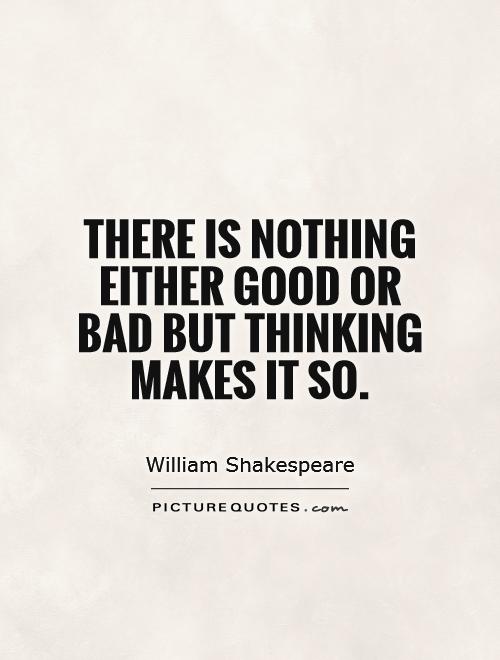There is nothing either good or bad but thinking makes it so

There is nothing either good or bad but thinking makes it so
In William Shakespeare's play Hamlet, the character Hamlet famously declares, "There is nothing either good or bad but thinking makes it so." This statement reflects the idea that our perceptions and interpretations of events ultimately shape our understanding of them as either positive or negative. In other words, it is our own thoughts and beliefs that determine whether something is good or bad, rather than any inherent qualities of the thing itself.Throughout the play, Hamlet grapples with the concept of moral ambiguity and the subjective nature of good and evil. He struggles with the idea that his uncle Claudius, who has murdered his father and married his mother, may not be entirely evil, but rather a complex and multifaceted individual. Hamlet's internal conflict reflects the idea that good and bad are not fixed categories, but rather fluid and dependent on individual perspectives.
This theme is further explored in other works by Shakespeare, such as Macbeth, where the protagonist's descent into madness and tyranny is driven by his own thoughts and beliefs about power and ambition. Macbeth's actions are not inherently evil, but rather the result of his own flawed reasoning and moral justifications. Similarly, in Othello, the tragic hero's downfall is caused by his own insecurities and jealousy, rather than any external forces.
Shakespeare's exploration of the subjective nature of good and bad challenges the audience to question their own beliefs and assumptions about morality. It forces us to consider the role of perception and interpretation in shaping our understanding of the world around us. Ultimately, Shakespeare suggests that our thoughts and beliefs have the power to influence our actions and shape our reality, for better or for worse.












 Friendship Quotes
Friendship Quotes Love Quotes
Love Quotes Life Quotes
Life Quotes Funny Quotes
Funny Quotes Motivational Quotes
Motivational Quotes Inspirational Quotes
Inspirational Quotes